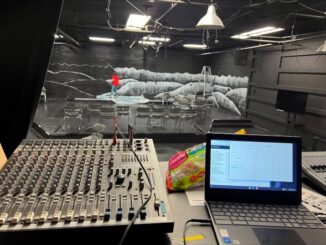The Resident Assistant (RA) selection process concluded just before spring break on March 7, when potential applicants received their initial offers from the Office of Residence Life.
The extensive process, which aims to select RAs for the 24 coveted spots, is described as “intense” by Area Coordinator (AC) Travis Eichelberger.
The process begins in February, just after the start of the spring semester. During this time, current RAs are asked what their future intentions are, such as whether they are even returning to Hood, whether they would like to be an RA again or not, and if so, if they would like to work in a different building. They are subject to evaluation and are not necessarily guaranteed an RA position next year.
Current RAs assist in the selection process by recommending students they believe would be good for the position, and invitations are sent out to those students. Students interested could also fill out an application from Residence Life.
In addition, applicants are required to submit a resume and three references before the interview process.
Students who were interested were required to attend at least one information session. An AC and RA are present at these sessions to answer the students’ questions.
According to RA Emily Kuykendall of Memorial Hall, the AC will then leave the information session so the applicants can talk to the RA “one on one before making a serious choice” and “ask honestly what the job is like.”
Then, potential applicants were interviewed individually, and then participated in a group interview that Eichelberger calls “carousel.”
To keep the individual interview as unbiased as possible, a random AC and RA who have no preconception of the applicant interview them so as not to unfairly influence the process.
The one hour interview consists of “skill-specific questions, scenarios,” and serves to gauge the applicant’s knowledge of the position, Eichelberger explained.
Kuykendall said that the interview helps determine the “true intentions of applicants, who may just be interested in the free room.” It also helps “weed out people” and “see their enthusiasm.”
The mandatory group interview, or “carousel,” serves to see how well applicants work with others and is made up of group activities. It is evaluated by current RAs and ACs, who don’t let their personal feelings bias the process.
Kuykendall said that group interview is “intimidating because the current RAs watch you,” but if you’re a genuine and good applicant, there is “nothing to worry about.”
Following the group interview, the ACs compiles a “rough comparison” of how the applicants did, according to Eichelberger. This comprises of the applicant’s individual interview evaluations by the RA and AC, three evaluations from carousel, their GPA, resume, references, and application itself.
The ACs then sit with Zach Luhman, the director of Residence Life, to build a potential RA list, Eichelberger said.
Each AC is in charge of eight RAs, who are chosen based on their “interaction with each other and students,” Eichelberger said. RAs need to be diverse, “for any type of student to come to.”
Once the returning RAs are in place, the ACs hire new RAs “to fill [the] gaps,” he continued.
The applicants receive their job offers and invitation letters via mail. These notify the applicants whether they were selected for hire or not.
If an applicant is selected, they are notified of the building they will be working in but not the floor. According to Kuykendall, this is “subject to change.” An applicant may also be selected as an alternate, who is chosen to fill the position of an RA who declines the position.
The ACs then wait and see who accepts or not, and fill the empty spots with alternates, Eichelberger said.
Kuykendall said that it is “always interesting who is chosen,” because “the process keeps you guessing.”
Right before the end of the spring semester, the Area Coordinators meet with their eight member RA staff to set guidelines and expectations for the coming year. This also gives a chance for the four RAs of each building to exchange contact information and get to know each other before they begin working together the following semester, Eichelberger said.
Eichelberger said that the goal for RA selection is to build “diverse staffs,” which encompass various elements and genders. They must be “representative of the students” who live in the building.
“Out of 150 people who live in the building,” there should be “at least one that a student can relate to,” Eichelberger said, referring to the importance of the RA position.
An RA, according to Eichelberger, must be a person with “initiative” and a “level of maturity to enforce policy.” RAs must “balance an act between being an authority figure and a peer.”
The four RAs who are put together in a building encompass different personality types, and must form a strong team based on their strengths and weaknesses
In the middle of the summer, the RAs are notified what floor they will be working on, which indicates whether they will be working with first-year students or upperclassmen.
Two weeks before the beginning of the fall semester, the RAs endure a week-long training session, prepare the building for students, post flyers, create room name tags, and help with summer orientation, Eichelberger said.
Eichelberger is in his third year at Hood, and notes that there are “constants every year” involving the RA selection process. There is always “large interest from first-years,” he said.
He encouraged students to reapply even if they weren’t hired, because that does not necessarily mean that they are unqualified, but that there are simply not enough RA positions. He also encouraged male students to apply, because there is a “strong[er] female pool as opposed to males.”
He said that every year is a “balancing act” between returning and graduating RAs. He noted that this year, as opposed to years past, there are “not a lot of graduating RAs,” but more returning juniors.
Eichelberger also spoke about the difficulty of choosing an RA staff for the future Assistant Director of Residence Life, who has not been hired yet. He said that they had to “keep in mind the personality type” of the potential person they hire so as it does not clash with the RA staff that has been selected, and to “be prepared.”
The candidate would be the replacement for Danielle Weaver, the former assistant director of Residence Life and the Area Coordinator of the apartments and Meyran Hall, who left the position in January.




Be the first to comment